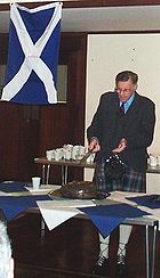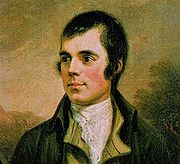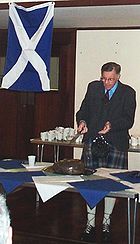
Burns supper
Encyclopedia

Poetry
Poetry is a form of literary art in which language is used for its aesthetic and evocative qualities in addition to, or in lieu of, its apparent meaning...
of the poet Robert Burns
Robert Burns
Robert Burns was a Scottish poet and a lyricist. He is widely regarded as the national poet of Scotland, and is celebrated worldwide...
, author of many Scots
Scots language
Scots is the Germanic language variety spoken in Lowland Scotland and parts of Ulster . It is sometimes called Lowland Scots to distinguish it from Scottish Gaelic, the Celtic language variety spoken in most of the western Highlands and in the Hebrides.Since there are no universally accepted...
poems. The suppers are normally held on or near the poet's birthday, 25 January, sometimes also known as Robert Burns Day or Burns Night (Burns Nicht), although they may in principle be held at any time of the year.
Burns suppers are most common in Scotland
Scotland
Scotland is a country that is part of the United Kingdom. Occupying the northern third of the island of Great Britain, it shares a border with England to the south and is bounded by the North Sea to the east, the Atlantic Ocean to the north and west, and the North Channel and Irish Sea to the...
and Northern Ireland
Northern Ireland
Northern Ireland is one of the four countries of the United Kingdom. Situated in the north-east of the island of Ireland, it shares a border with the Republic of Ireland to the south and west...
, but occur wherever there are Burns
Robert Burns
Robert Burns was a Scottish poet and a lyricist. He is widely regarded as the national poet of Scotland, and is celebrated worldwide...
Club
Club
A club is an association of two or more people united by a common interest or goal. A service club, for example, exists for voluntary or charitable activities; there are clubs devoted to hobbies and sports, social activities clubs, political and religious clubs, and so forth.- History...
s, Scottish Societies, expatriate Scots, or aficionados of Burns' poetry. There is a particularly strong tradition of them in southern New Zealand
New Zealand
New Zealand is an island country in the south-western Pacific Ocean comprising two main landmasses and numerous smaller islands. The country is situated some east of Australia across the Tasman Sea, and roughly south of the Pacific island nations of New Caledonia, Fiji, and Tonga...
's main city Dunedin
Dunedin
Dunedin is the second-largest city in the South Island of New Zealand, and the principal city of the Otago Region. It is considered to be one of the four main urban centres of New Zealand for historic, cultural, and geographic reasons. Dunedin was the largest city by territorial land area until...
, of which Burns' nephew Thomas Burns
Thomas Burns (New Zealand)
Thomas Burns was a prominent early European settler and religious leader of the province of Otago, New Zealand.Burns was baptised at Mauchline, Ayrshire, Scotland in April 1796, the son of estate manager Gilbert Burns, who was the brother of the poet Robert Burns...
was a founding father.
The first suppers were held in Ayrshire
Ayrshire
Ayrshire is a registration county, and former administrative county in south-west Scotland, United Kingdom, located on the shores of the Firth of Clyde. Its principal towns include Ayr, Kilmarnock and Irvine. The town of Troon on the coast has hosted the British Open Golf Championship twice in the...
at the end of the 18th century by Robert Burns' friends on the anniversary of his death, 21 July, In Memoriam and they have been a regular occurrence ever since. The first Burns club, known as The Mother Club, was founded in Greenock
Greenock
Greenock is a town and administrative centre in the Inverclyde council area in United Kingdom, and a former burgh within the historic county of Renfrewshire, located in the west central Lowlands of Scotland...
in 1801 by merchants born in Ayrshire
Ayrshire
Ayrshire is a registration county, and former administrative county in south-west Scotland, United Kingdom, located on the shores of the Firth of Clyde. Its principal towns include Ayr, Kilmarnock and Irvine. The town of Troon on the coast has hosted the British Open Golf Championship twice in the...
, some of whom had known Burns. They held the first Burns supper on what they thought was his birthday on 29 January 1802, but in 1803 discovered from the Ayr parish records that the correct date was 25 January 1759, and since then suppers have been held to 25 January, Burns' birthday.
Burns suppers may be either formal or informal. Informal suppers typically include haggis
Haggis
Haggis is a dish containing sheep's 'pluck' , minced with onion, oatmeal, suet, spices, and salt, mixed with stock, and traditionally simmered in the animal's stomach for approximately three hours. Most modern commercial haggis is prepared in a casing rather than an actual stomach.Haggis is a kind...
(a traditional Scottish dish), Scotch whisky
Scotch whisky
Scotch whisky is whisky made in Scotland.Scotch whisky is divided into five distinct categories: Single Malt Scotch Whisky, Single Grain Scotch Whisky, Blended Malt Scotch Whisky , Blended Grain Scotch Whisky, and Blended Scotch Whisky.All Scotch whisky must be aged in oak barrels for at least three...
and the recitation of Burns' poetry. Formal dinners are hosted by organisations such as Burns clubs, the Freemasons or St Andrews Societies and occasionally end with dancing when ladies are present. However whether they are single sex or not, the formal suppers follow a standard format which is as follows.
Host's welcoming speech
The host says a few words welcoming everyone to the supper and perhaps stating the reason for it. The event is declared open.All of the guests are seated and grace
Grace (prayer)
Grace is a name for any of a number of short prayers said or an unvoiced intention held prior to or after eating, thanking God and/or the entities that have given of themselves to furnish nutrients to those partaking in the meal. Some traditions hold that grace and thanksgiving imparts a blessing...
is said, usually using the Selkirk Grace. The Selkirk Grace is a well-known thanksgiving said before meals, using the Scots
Modern Scots
Modern Scots describes the varieties of Scots traditionally spoken in Lowland Scotland and parts of Ulster from 1700.Throughout its history, Modern Scots has been undergoing a process of language attrition, whereby successive generations of speakers have adopted more and more features from...
language. Although attributed to Burns, the Selkirk Grace was already known in the 17th century, as the "Galloway
Galloway
Galloway is an area in southwestern Scotland. It usually refers to the former counties of Wigtownshire and Kirkcudbrightshire...
Grace" or the "Covenanters' Grace". It came to be called the Selkirk Grace because Burns was said to have delivered it at a dinner given by the Earl of Selkirk
Dunbar Douglas, 4th Earl of Selkirk
Dunbar Douglas, 4th Earl of Selkirk was a Scottish peer. Born Dunbar Hamilton, he was the grandson of Lord Basil Hamilton, younger brother to John Hamilton, 3rd Earl of Selkirk....
.
The Selkirk Grace
- Some hae meat and canna eat,
- And some wad eat that want it;
- But we hae meat, and we can eat,
- And sae let the Lord be thankit.
The supper then starts with the soup course. Normally a Scottish soup such as Scotch Broth
Scotch broth
Scotch broth is a filling soup, originating in Scotland but now obtainable worldwide. The principal ingredients are usually barley, stewing or braising cuts of lamb or mutton , and root vegetables such as carrots, turnips or swedes. Greens, particularly cabbage and leeks, can also be added, usually...
, Potato Soup or Cock-a-Leekie
Cock-a-leekie soup
Cock-a-leekie soup is a Scottish soup dish of leeks and chicken stock. The original recipe added prunes during cooking, and traditionalists still garnish with a julienne of prunes....
is served.
Entrance of the haggis

Haggis
Haggis is a dish containing sheep's 'pluck' , minced with onion, oatmeal, suet, spices, and salt, mixed with stock, and traditionally simmered in the animal's stomach for approximately three hours. Most modern commercial haggis is prepared in a casing rather than an actual stomach.Haggis is a kind...
on a large dish. It is usually brought in by the cook, generally while a piper plays bagpipes
Great Highland Bagpipe
The Great Highland Bagpipe is a type of bagpipe native to Scotland. It has achieved widespread recognition through its usage in the British military and in pipe bands throughout the world. It is closely related to the Great Irish Warpipes....
and leads the way to the host's table, where the haggis is laid down. He/she might play 'A man's a man for a' that
A Man's A Man for A' That
"Is There for Honest Poverty", commonly known as "A Man's a Man for A' That", is a 1795 Scots song by Robert Burns, famous for its expression of egalitarian ideas of society, which may be seen as anticipating the ideas of liberalism that arose in the 18th century, and those of socialism which arose...
', 'Robbie Burns Medley' or 'The Star O' Robbie Burns'. The host, or perhaps a guest with a talent, then recites the Address to a Haggis
| Address To a Haggis | ||
Fair fa' your honest, sonsie face, Great chieftain o' the puddin-race! Aboon them a' ye tak your place, Painch, tripe, or thairm: Weel are ye wordy o' a grace As lang's my arm. |
(sonsie = jolly/cheerful) (aboon = above) (painch = paunch/stomach, thairm = intestine) |
|
The groaning trencher there ye fill, Your hurdies like a distant hill, Your pin wad help to mend a mill In time o' need, While thro' your pores the dews distil Like amber bead. |
(hurdies = buttocks) |
|
His knife see rustic Labour dicht, An' cut you up wi' ready slicht, Trenching your gushing entrails bricht, Like ony ditch; And then, O what a glorious sicht, Warm-reekin, rich! |
(dicht = wipe, here with the idea of sharpening) (slicht = skill) (reeking = steaming) |
|
Then, horn for horn, they stretch an' strive: Deil tak the hindmaist! on they drive, Till a' their weel-swall'd kytes belyve, Are bent like drums; Then auld Guidman, maist like to rive, "Bethankit" hums. |
(deil = devil) (swall'd = swollen, kytes = bellies, belyve = soon) (bent like = tight as) (auld Guidman = the man of the house, rive = tear, i.e. burst) |
|
Is there that o're his French ragout Or olio that wad staw a sow, Or fricassee wad mak her spew Wi' perfect scunner, Looks down wi' sneering, scornfu' view On sic a dinner? |
(olio = stew, from Spanish olla'/stew pot, staw = make sick) (scunner = disgust) |
|
Poor devil! see him ower his trash, As feckless as a wither'd rash, His spindle shank, a guid whip-lash, His nieve a nit; Thro' bloody flood or field to dash, O how unfit! |
(nieve = fist, nit = louse's egg, i.e. tiny) |
|
But mark the Rustic, haggis fed, The trembling earth resounds his tread. Clap in his wallie nieve a blade, He'll mak it whistle; An' legs an' arms, an' heads will sned, Like taps o' thristle. |
(wallie = mighty, nieve = fist) (sned = cut off) (thristle = thistle) |
|
Ye Pow'rs wha mak mankind your care, And dish them out their bill o' fare, Auld Scotland wants nae skinkin ware That jaups in luggies; But, if ye wish her gratefu' prayer, Gie her a haggis! |
(skinkin ware = watery soup) (jaups = slops about, luggies = two-"eared" (handled) continental bowls) |
At the line His knife see rustic Labour dicht the speaker normally draws and cleans a knife, and at the line An' cut you up wi' ready slicht, plunges it into the haggis and cuts it open from end to end. When done properly this "ceremony" is a highlight of the evening.
Supper
At the end of the poem, a Scotch whisky toast will be proposed to the haggis, then the company will sit and enjoy the meal. The main course is haggis, and is traditionally served with mashed potatoes (tatties) and mashed turnip (neepsRutabaga
The rutabaga, swede , turnip or yellow turnip is a root vegetable that originated as a cross between the cabbage and the turnip; see Triangle of U...
). A dessert course, cheese courses, coffee, etc. may also be part of the meal. The courses normally use traditional Scottish recipes. For instance dessert may be cranachan
Cranachan
Cranachan is a traditional Scottish dessert. In more modern times it is usually made from a mixture of whipped cream, whisky, honey , and fresh raspberries with toasted oatmeal soaked overnight, in a little whisky. Atholl brose is a drink using similar ingredients but does not contain raspberries...
or Tipsy Laird (whisky trifle) followed by oatcakes and cheese, all washed down with the "water of life" (uisge beatha) – Scotch whisky.
When the meal reaches the coffee stage various speeches and toasts are given. In order, the core speeches and toasts are as follows.
Immortal memory
One of the guests gives a short speech, remembering some aspect of Burns' life or poetry. This may be light-hearted or intensely serious. The speaker should always prepare a speech with his audience in mind, since above all, the Burns' supper should be entertaining.Everyone drinks a toast to Robert Burns.
Appreciation
The host will normally say a few words thanking the previous speaker for his speech and perhaps commenting on some of the points raised.Toast to the Lassies
This was originally a short speech given by a male guest in thanks to those women who had prepared the meal. However nowadays it is much more wide ranging, and generally covers the male speaker's view on women. It is normally amusing but should never be offensive, particularly bearing in mind that it will be followed by a reply from the "lassies" concerned.The men drink a toast to the women's health.
Reply to the Toast to the Lassies
This is occasionally (and humorously) called the 'Toast to the Laddies', and like the previous toast it is generally quite wide ranging nowadays. In it a female guest will give her views on men and reply to any specific points raised by the previous speaker. Like the previous speech this should be amusing but not offensive. Quite often the speakers giving this toast and the previous one will collaborate so that the two toasts complement each other.Other toasts and speeches
These may follow if desired. It is not unusual to toast the locality or nation in which the supper is being held.Works by Burns
After the speeches, there may be singing of songs by Burns -- Ae Fond Kiss, Parcel O' Rogues, A Man's a Man, etc.—and more poetry -- To a MouseTo a Mouse
"To a Mouse, on Turning Her Up in Her Nest with the Plough" is a Scots poem written by Robert Burns in 1785, and was included in the Kilmarnock volume...
, To a Louse
To a Louse
"To A Louse, On Seeing One on a Lady's Bonnet at Church" is a 1786 Scots language poem by Robert Burns in his favourite meter, Standard Habbie. The poem's theme is contained in the final verse:...
, Tam O' Shanter, The Twa Dugs, Holy Willie's Prayer, etc. This may be done by the individual guests or by invited experts. It goes on for as long as the guests wish and may include other works by poets influenced by Burns, particularly poets writing in Scots.
Closing
Finally the host will wind things up, calling on one of the guests to give the vote of thanks, after which everyone is asked to stand, join hands, and sing Auld Lang SyneAuld Lang Syne
"Auld Lang Syne" is a Scots poem written by Robert Burns in 1788 and set to the tune of a traditional folk song . It is well known in many countries, especially in the English-speaking world; its traditional use being to celebrate the start of the New Year at the stroke of midnight...
which brings the evening to an end.

